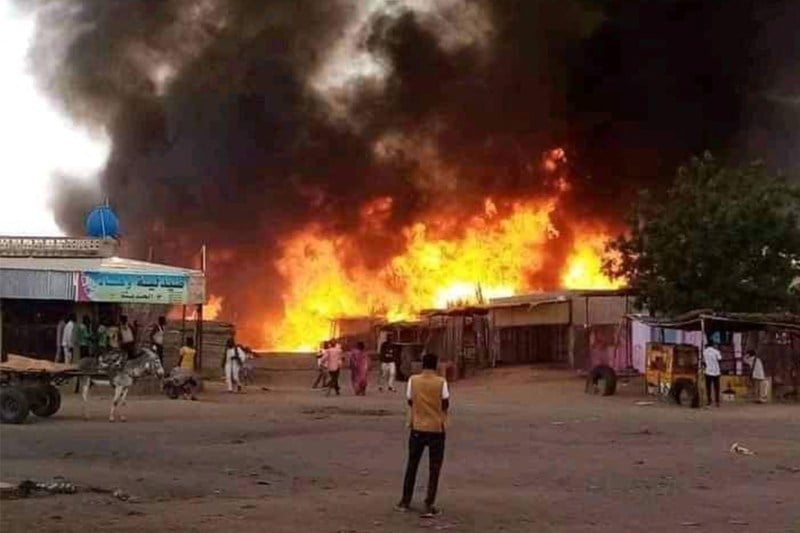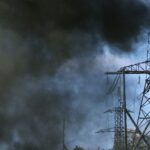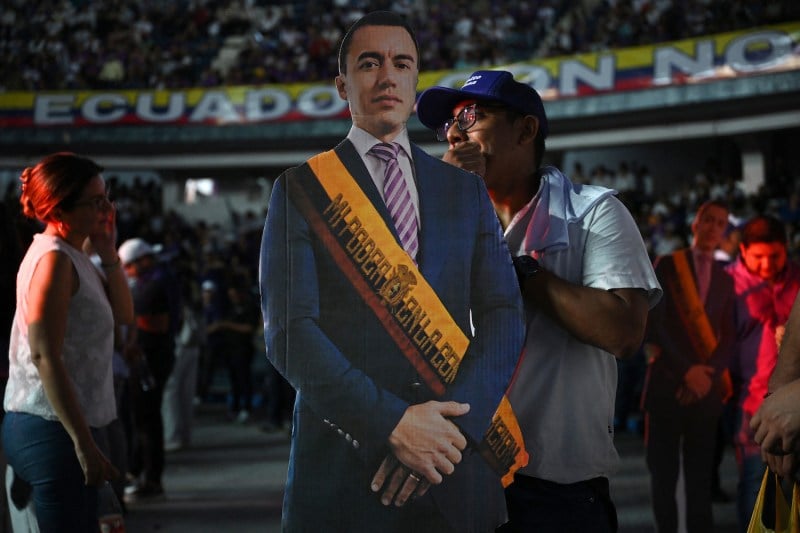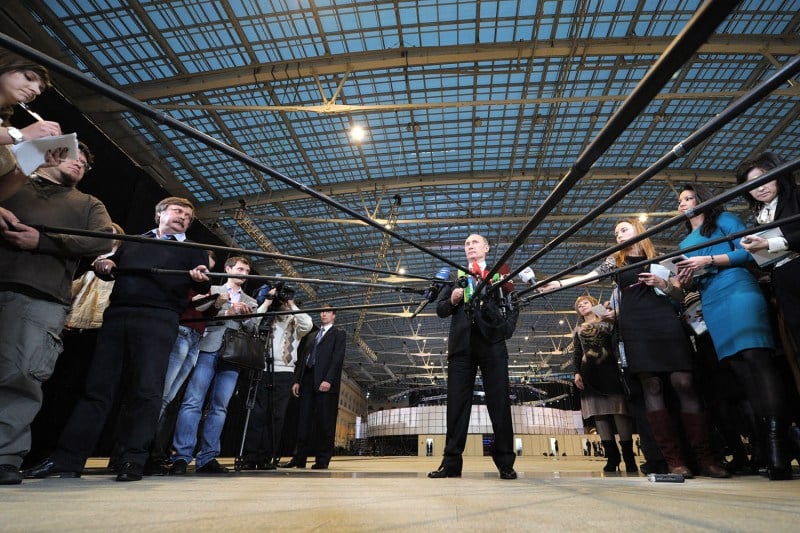Congress Has a Choice on Sudan

Congress Has a Choice on Sudan
Trump’s indifference and aid cuts are exacerbating the world’s largest humanitarian crisis.
A man looks on as a fire rages in a livestock market area in Al-Fasher, the capital of Sudan’s North Darfur state, on Sept. 1, 2023. AFP via Getty Images
Since April 2023, when war erupted between Sudan’s military and the paramilitary Rapid Support Forces (RSF), more than 150,000 people have been killed in Sudan. The U.S. State Department has determined that the RSF’s brutal ethnic cleansing, mass sexual violence, and indiscriminate slaughter amount to crimes against humanity and genocide and that both the RSF and the Sudanese Armed Forces (SAF) have committed war crimes.
Around 50 million people now face the prospect of famine, acute food insecurity, or displacement in Sudan. The warring parties are as far away from a negotiated solution as they have ever been, with the RSF declaring a parallel government in February and the SAF recapturing the presidential palace in Khartoum from RSF control on March 21. Yet U.S. President Donald Trump—true to form when it comes to his lack of Africa policy—has not publicly acknowledged the suffering, let alone lifted a finger to stop it. His response so far has been staggering indifference and, in some cases, outright sabotage.
Since April 2023, when war erupted between Sudan’s military and the paramilitary Rapid Support Forces (RSF), more than 150,000 people have been killed in Sudan. The U.S. State Department has determined that the RSF’s brutal ethnic cleansing, mass sexual violence, and indiscriminate slaughter amount to crimes against humanity and genocide and that both the RSF and the Sudanese Armed Forces (SAF) have committed war crimes.
Around 50 million people now face the prospect of famine, acute food insecurity, or displacement in Sudan. The warring parties are as far away from a negotiated solution as they have ever been, with the RSF declaring a parallel government in February and the SAF recapturing the presidential palace in Khartoum from RSF control on March 21. Yet U.S. President Donald Trump—true to form when it comes to his lack of Africa policy—has not publicly acknowledged the suffering, let alone lifted a finger to stop it. His response so far has been staggering indifference and, in some cases, outright sabotage.
Without warning or justification, on Feb. 26, Trump and U.S. Secretary of State Marco Rubio illegally and abruptly canceled U.S.-funded emergency aid for Sudan, including food assistance and health services. In many cases, these services were lifelines for civilians. Since pausing and canceling aid, almost 80 percent of emergency food kitchens in Sudan have closed. And, for example, an NGO informed me that water and sanitation services are suspended in one state in eastern Sudan because the U.S. Agency for International Development hasn’t issued any payments to the implementer, meaning that more than 40,000 internally displaced people now face a heightened risk of contracting cholera.
By cutting off aid when the Sudanese people need it most, Trump has inarguably deepened the humanitarian crisis—and upended decades of precedent of bipartisan support for humanitarian assistance.
The United States has historically been a steadfast friend to the Sudanese people, dating to the George W. Bush administration. When he appointed Sen. Jack Danforth as the first U.S. special envoy to Sudan, Bush said, “This is an issue that is really important. It is important to this administration, it’s important to the world.”
Since then, both Republican and Democratic administrations have provided humanitarian assistance, brokered peace, and advanced democracy in Sudan—spanning the first genocide in Darfur two decades ago, the separation of Sudan and South Sudan in 2011, and the stunning democratic revolution of 2018 and 2019. And while Washington, under the administration of former President Joe Biden, rightfully sanctioned leaders of the RSF and SAF in January for war crimes, crimes against humanity, and, in the case of the RSF, genocide, it must apply more pressure, given the severity of atrocities committed by the warring parties.
External military support is one of the primary drivers of Sudan’s civil war, and Washington has allowed it to continue unchecked. The United Arab Emirates has armed the RSF with drones and other weapons since the early months of the war. This is not speculation: The U.S. government, as well as international organizations and reporting by several media outlets (including the New York Times, Reuters, the United Nations, and the Sudan Conflict Observatory), has documented it. The Biden administration began diplomatically pressuring the UAE to cut off its support last year and notified Congress that the UAE had given assurances that it was not providing support to the RSF.
Unfortunately, the Emirati reassurances have proved false, and it continues providing support to the RSF. Now, under Trump’s watch, the UAE has faced no consequences for supporting the genocide.
While Trump may not be focused on the conflict in Sudan, Congress is not without power to act—and act it must to prevent more innocent lives from being lost. That is why I, alongside Rep. Sara Jacobs, have introduced the U.S. Engagement in Sudanese Peace Act to force action. The legislation would hold perpetrators of atrocities accountable by requiring sanctions on those who have enabled genocide, war crimes, or crimes against humanity; blocked humanitarian aid; or violated the U.N. arms embargo on Darfur. It also prohibits the sale of major U.S. defense equipment to countries fueling the conflict. The legislation bolsters the U.S. special envoy for Sudan by authorizing funding and extending the position’s timeline. Further, the bill would increase humanitarian aid and provide support to protect civilians by authorizing U.S. assistance for a U.N., African Union, or other multinational force for that purpose.
And though it is unclear whether Republicans, who have traditionally understood the need for action on Sudan, will help send this legislation to the president’s desk, I want to be clear that I will use my position as the ranking member of the House Foreign Affairs Committee to block all major U.S. defense sales to the UAE—and to any country that supports this brutal conflict—until its military support for the RSF ends. Under long-standing practice, administrations of both parties have submitted such major defense sales for review to the House Foreign Affairs and Senate Foreign Relations committees to address any congressional concerns before they can proceed.
What is happening in Sudan is not a theoretical crisis but a humanitarian catastrophe—involving targeted attacks against civilians and the displacement more than 12 million people—playing out in real time. Congress has a choice: We can sit silently and allow Trump’s indifference to the conflict and crisis to continue, or we can act. We can demand that the UAE and other involved parties end their military support for those waging this horrific war. We can press Trump to reinstate congressionally approved funds for emergency aid and demand a diplomatic push toward a cease-fire.
The Sudanese people have suffered greatly and had their democratic aspirations torn away by strongmen who refuse to give up power. The United States must show that Sudan is not a forgotten conflict. It is the world’s largest humanitarian crisis, and there are substantive actions that we can take to offer humanitarian relief, end military support to the warring parties, and achieve a lasting peace.
Gregory W. Meeks is the U.S. representative for New York’s 5th District, the ranking member of the House Foreign Affairs Committee, and a senior member of the House Financial Services Committee. First elected to Congress in 1998, Meeks is a multilateralist with decades of experience in foreign policy.
More from Foreign Policy
-

Zelensky stands before four Ukrainian flags; cameras are pointed at him. It’s Time for Ukraine to Accept an Ugly Peace
Seven things for Zelensky to keep in mind as cease-fire negotiations start.
-

Then-presidential candidate Donald Trump speaks before a capacity crowd at a rally for his campaign on April 10, 2016 in Rochester, New York. Trump Is Not a Revolutionary
Not all political upheaval is created equal.
-

German soldiers unload the U.S.-made MIM-104 Patriot surface-to-air missile system in Jasionka, Poland. The Latest Russian Missile Is Bad News for NATO
Oreshnik is a different beast from its predecessors.
-

French Emperor Napoleon Bonaparte leads the final assault by the Imperial Guard before his defeat at the Battle of Waterloo in what is today Belgium, on June 18, 1815. The Cost of Ignoring Geopolitics
Like Napoleon and the Ming dynasty, Europe is paying the price for strategic blindness.









Join the Conversation
Commenting on this and other recent articles is just one benefit of a Foreign Policy subscription.
Already a subscriber?
.
Subscribe
Subscribe
View Comments
Join the Conversation
Join the conversation on this and other recent Foreign Policy articles when you subscribe now.
Subscribe
Subscribe
Not your account?
View Comments
Join the Conversation
Please follow our comment guidelines, stay on topic, and be civil, courteous, and respectful of others’ beliefs.
Change your username |
Log out
Change your username:
CANCEL
Confirm your username to get started.
The default username below has been generated using the first name and last initial on your FP subscriber account. Usernames may be updated at any time and must not contain inappropriate or offensive language.